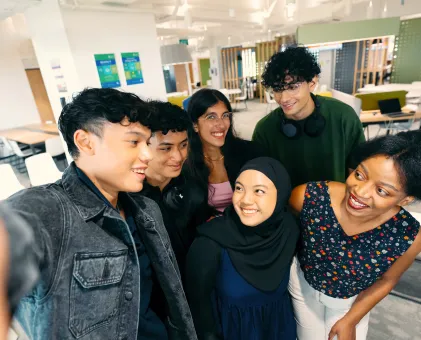Why your student ambassadors don't have to be students

No two students are alike. They each have unique educational needs and aspirations.
When building your student ambassador program, keep this in mind. Current students might not be the right fit for everyone; they may only hold the answers to some of a prospect's questions.
Ideally, you need to cover a breadth of experience. The more unique perspectives you offer, the better you'll bridge your institution's 'insight gap'.
So, let's take a look at three types of ambassadors that aren't students.
1. Alumni and recent graduates
Prospects rate an institution's 'perceived ability to boost later career opportunities' as the third most important factor when choosing a university.
While your students can demonstrate the current first-hand experience of university life, alumni can answer the question of 'what's next?'.
For instance, a recent graduate could talk about their current job and what led them there. Did your institution offer employment support or career fairs? Were they given a work placement opportunity? This is something many students - including those from other countries - will find valuable.
However, many of your alumni will be incredibly busy with their careers and home life. So, to make the ambassador role easier for them, prioritize a digital-first approach.
With the right platform, they can align themselves with your other student ambassadors and work flexibly around their own commitments.
2. Academic staff
With prospects placing heavy importance on course curriculum, structure and assessment, it makes sense to loop your academic staff into your ambassador program, too.
Lecturers, support staff and PhD students can offer insights into:
- Teaching quality
- Contact hours and anticipated number of lectures and seminars
- Materials needed for the course
- Teaching methods, including any online learning approaches
- How courses adapt to different learning styles
- One-to-one feedback sessions
Similarly to your alumni ambassadors, you'll want to ease their ambassador duties by offering an online platform with the right content and direct communication features. There, they can provide experience-led content, chat with prospects, and answer common FAQs.
3. Career support teams
Only 13 percent of Year 11 and 12 school students in the UK feel 'very confident' about making career decisions. In addition to this, 83 percent of these students do not know how to contact a careers advisor outside of school.
So, bring your career support to them. Get your advisors to promote your unique services, career fairs and work placement opportunities.
By providing accessible, online career content to your prospects, you can help to inform their higher education decisions.
Create a diverse student ambassador team
When bridging the student insight gap, you should bring as many people on board as possible.
From current students to alumni and university staff, there are countless unique perspectives to make the most of. But that's just the beginning. To really cultivate a successful student ambassador team, you'll also want to get more granular.
You may choose to enlist older students, those with disabilities, or students from more ethnically diverse backgrounds. Try to create a team that's truly diverse. That way, you'll be better able to cater for each prospective student.
Join our free webinar
Join our free, 60 minute webinar to find out how to get the most out of your student ambassador program in 2021/22.
Tuesday August, 31 (16:00 BST/ 08:00/ PT 11.00 EST)
During the webinar you will:
- Hear from special guest speakers Texas Tech University, Manchester Met University, and Marty Bennett from SMIE Consulting.
- Get the latest industry best-practice on how to effectively set-up, manage, and incentivize your ambassadors
- Get advanced access to our brand new whitepaper: 'The ultimate guide to Student Ambassador programs in 2021'.


